Kidney friendly pasta should be a staple in everyone’s pantry. There are endless ways to make pasta – select a kidney friendly sauce (or make your own!), toss in some veggies, and you have yourself a kidney friendly meal. If you’ve taken our CKD course, you even know how you can incorporate higher sodium sauces into meals without going over on sodium for the day. If you’re on dialysis, you can either choose a higher protein pasta, or add in your favorite protein to round out your meal.
This post may contain affiliate links through which we may earn a small commission to help keep this website free.
There are many different pasta options on the market these days to meet a variety of nutritional demands. Whether you need a pasta that is low protein or high protein, low potassium or high potassium, or gluten free – there is an option that is right for you! In this article, we will explore the different types of pastas available on the market and their nutrition and give you links to the brands that meet your nutritional needs.
Table of Contents
- Types of Pasta (lowest protein first)
- Cassava Based Pasta & Kidney Disease
- Rice Based Pasta & Kidney Disease
- Wheat Based Pasta & Kidney Disease
- Legume-Based Pasta & Kidney Disease
- Vegetable Based Pasta & Kidney Disease
Types of Pasta (lowest protein first)
Cassava Based Pasta & Kidney Disease
To my knowledge, there is only one Cassava-based pasta on the market. This is the lowest protein pasta type available, so it can be a really great option for people with kidney disease who are not on dialysis. Choosing a lower protein pasta will give you some additional flexibility in choosing toppings and mix-ins that may contain protein without going over on your overall protein intake. If you also have diabetes, be sure to limit your portion of pasta to a single serving and to include plenty of non-starchy vegetables with the meal.
Jovial Cassava Pasta
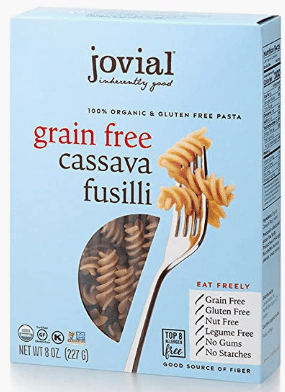
- Calories: 200
- Protein: 1g
- Carbohydrate: 49g
- Fat: 0g
- Sodium: 0mg
- Phosphorus
Additives: None - Potassium: 240mg
- Calcium: 35mg
- Fiber: 4g
- Sugar: 2g
Rice Based Pasta & Kidney Disease
Pad Thai Rice Noodles, Vermicelli, White Rice Noodles
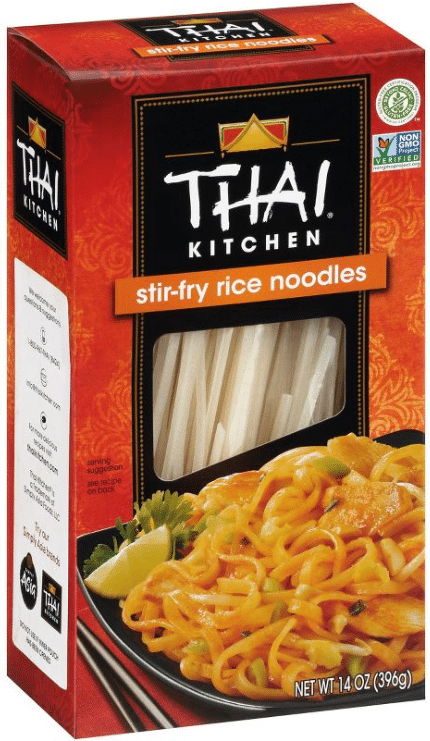
- Calories: 200
- Protein: 4g
- Carbohydrate: 45g
- Fat: 0.5g
- Sodium: 0mg
- Phosphorus
Additives: None - Potassium: 0mg
- Calcium: 0mg
- Fiber: 0g
- Sugar: 0g
Rice and Corn Based Pasta
The majority of pastas that are marketed as ‘gluten-free’ are made of rice and corn. These will all be lower in protein compared to traditional wheat based pastas. As with other grain based pastas, if you also have diabetes, be sure to limit your portion of pasta to a single serving and to include plenty of non-starchy vegetables with the meal.
365 Gluten Free Penne Regate
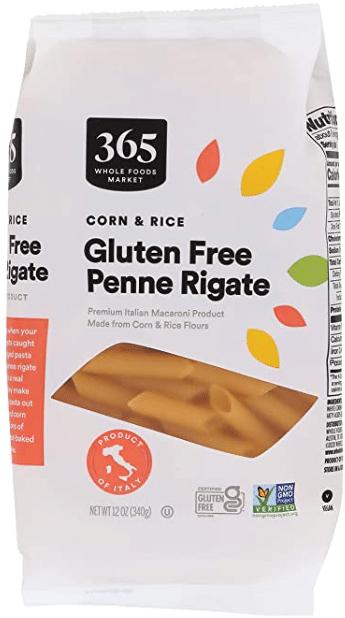
- Calories: 200
- Protein: 4g
- Carbohydrate: 44g
- Fat: 1.5g
- Sodium: 0mg
- Phosphorus
Additives: None - Potassium: 0mg
- Calcium: 0mg
- Fiber: 1g
- Sugar: 0g
Ancient Harvest Gluten Free Rotini
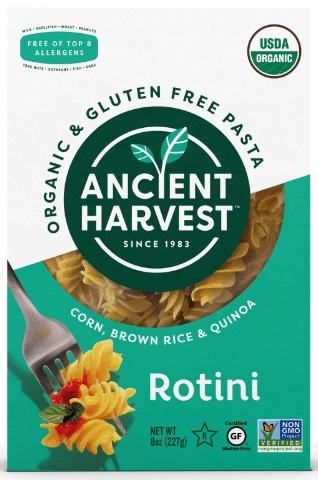
- Calories: 200
- Protein: 4g
- Carbohydrate: 42g
- Fat: 2g
- Sodium: 0mg
- Phosphorus
Additives: None - Potassium: 160mg
- Calcium: 5mg
- Fiber: 3g
- Sugar: 0g
Barilla Gluten Free Rotini
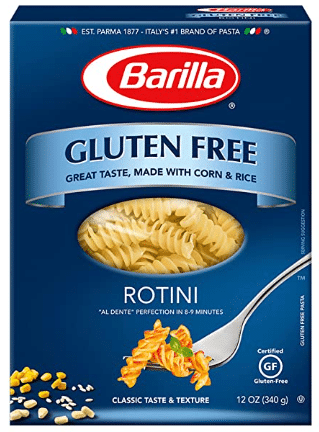
- Calories: 190
- Protein: 4g
- Carbohydrate: 44g
- Fat: 1g
- Sodium: 0mg
- Phosphorus
Additives: None - Potassium: 77mg
- Calcium: 0mg
- Fiber: 2g
- Sugar: 0g
Colavita Gluten Free Fusilli
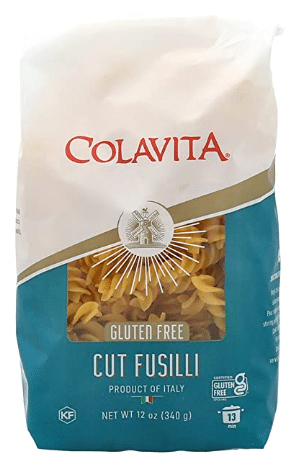
- Calories: 200
- Protein: 4g
- Carbohydrate: 44g
- Fat: 1g
- Sodium: 0mg
- Phosphorus
Additives: None - Potassium: 0mg
- Calcium: 0mg
- Fiber: 2g
- Sugar: 0g
Ronzoni Gluten Free
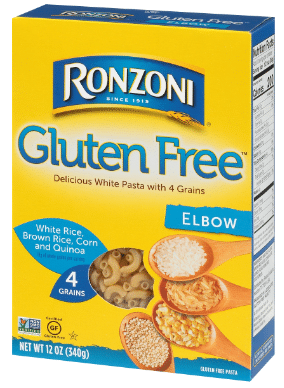
- Calories: 200
- Protein: 4g
- Carbohydrate: 44g
- Fat: 1.5g
- Sodium: 0mg
- Phosphorus
Additives: None - Potassium: 65mg
- Calcium: 0mg
- Fiber: 2g
- Sugar: 0g
Target Gluten Free Rotini
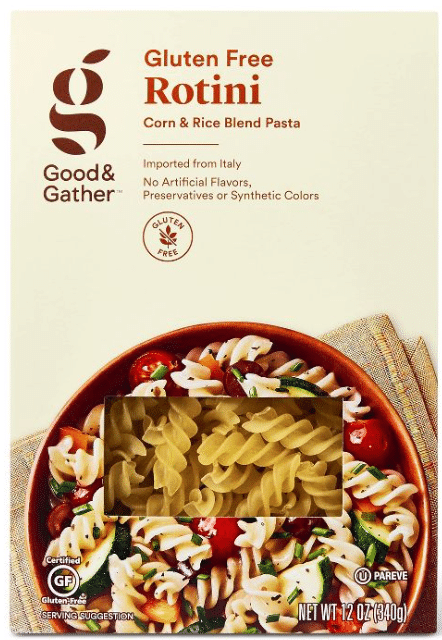
- Calories: 200
- Protein: 3g
- Carbohydrate: 45g
- Fat: 1g
- Sodium: 0mg
- Phosphorus
Additives: None - Potassium: 0mg
- Calcium: 0mg
- Fiber: 1g
- Sugar: 0g

Brown Rice Based
Delallo Gluten Free Fusilli Pasta
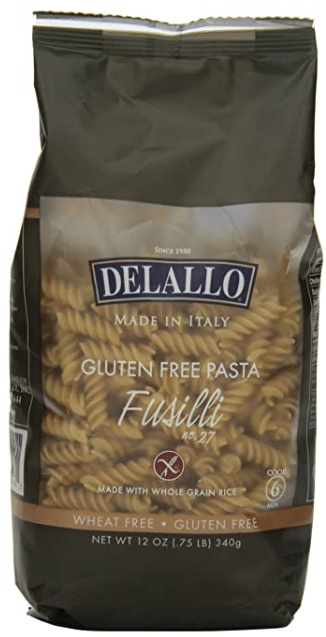
- Calories: 210
- Protein: 5g
- Carbohydrate: 43g
- Fat: 2g
- Sodium: 0mg
- Phosphorus
Additives: None - Calcium: 0mg
- Fiber: 5g
- Sugar: 0g
Wheat Based Pasta & Kidney Disease
Wheat based pastas can be whole grain or just the traditional non-whole grain pasta. Notice that they both contain 7g of protein per serving, but that the whole grains version is higher in fiber. Choosing the higher fiber version is probably the better option for someone with CKD, given the numerous benefits of getting adequate fiber in your day. Most people with CKD following a lower protein diet can easily incorporate whole wheat pasta into thier meals and still stay on track with their protein goals. Be sure to limit your portion size to one serving and include lots of non-starchy vegetables with your meal.
Note: Because there are so many options for regular pasta and whole wheat pasta, and the nutrition is nearly identical across brands, we are only featuring one option of each below.
Target Whole Grain Pasta
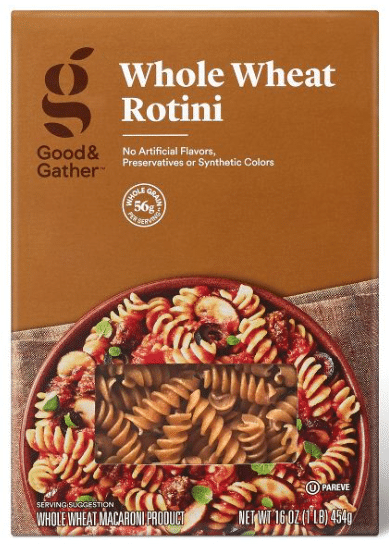
- Calories: 200
- Protein: 7g
- Carbohydrate: 41g
- Fat: 1.5g
- Sodium: 0mg
- Phosphorus
Additives: None - Potassium: 260mg
- Calcium: 0mg
- Fiber: 5g
- Sugar: 0g
Target Rotini
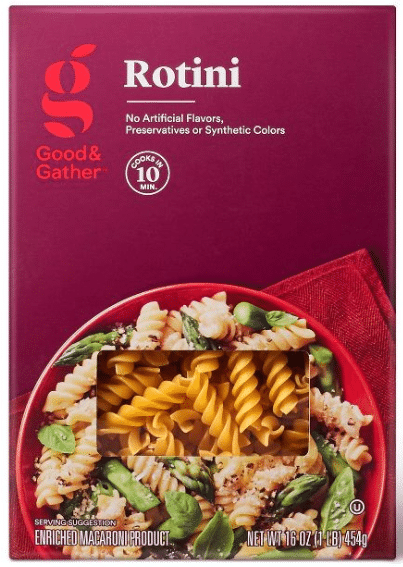
- Calories: 200
- Protein: 7g
- Carbohydrate: 42g
- Fat: 1g
- Sodium: 0mg
- Phosphorus
Additives: None - Potassium: 110mg
- Calcium: 12mg
- Fiber: 2g
- Sugar: 1g
Legume-Based Pasta & Kidney Disease
Banza Chickpea Pasta
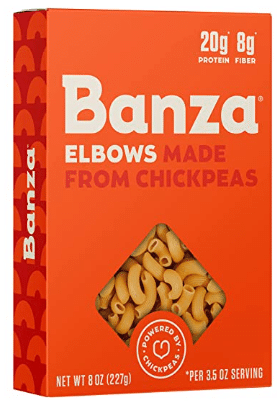
- Calories: 190
- Protein: 11g
- Carbohydrate: 35g
- Fat: 3g
- Sodium: 20mg
- Phosphorus
Additives: None - Potassium: 520mg
- Calcium: 40mg
- Fiber: 5g
- Sugar: 1g
The Only Bean Black Soybean Pasta
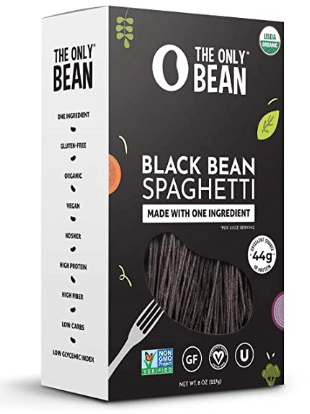
- Calories: 190
- Protein: 25g
- Carbohydrate: 20g
- Fat: 3.5g
- Sodium: 0mg
- Phosphorus
Additives: None - Potassium: 900mg
- Calcium: 0mg
- Fiber: 0g
- Sugar: 0g
Barilla Protein Plus
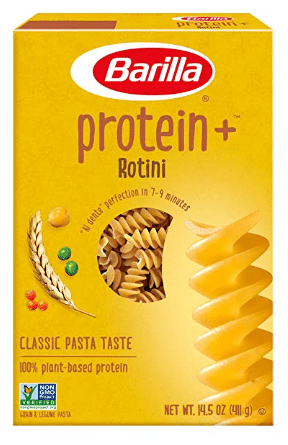
- Calories: 1900
- Protein: 10g
- Carbohydrate: 39g
- Fat: 1g
- Sodium: 0mg
- Phosphorus
Additives: None - Potassium: 245mg
- Calcium: 14mg
- Fiber: 4g
- Sugar: 0g
Vegetable Based Pasta & Kidney Disease
Fresh Brand Zucchini Spirals
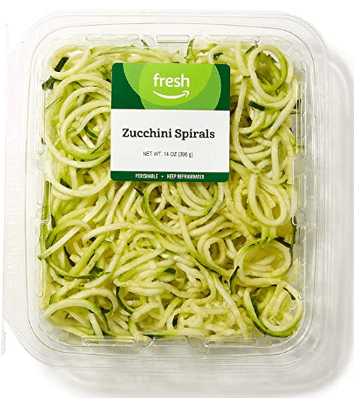
- Calories: 15
- Protein: 1g
- Carbohydrate: 3g
- Fat: 0g
- Sodium: 5mg
- Phosphorus
Additives: None - Potassium: 222mg
- Calcium: 14mg
- Fiber: 1g
- Sugar: 2g

A kidney diet that limits or avoids phosphorus additives and keeps sodium less than 2300 mg per day is recommended.


